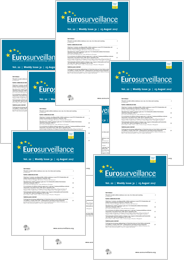- Home
- Weekly releases (1997–2007)
- Previous Issues
- Volume 7, Issue 9, 27/Feb/2003
Weekly releases (1997–2007) - Volume 7, Issue 9, 27 February 2003
Volume 7, Issue 9, 2003
- Articles
-
-
-
H5N1 avian influenza virus: human cases reported in southern China
More LessTwo cases of confirmed influenza due to the avian influenza A H5N1 virus were reported last week in Hong Kong (1). The cases occurred in a Hong Kong family who had recently visited Fujian province in southern China. The daughter, aged 8 years, died following a respiratory illness. The cause of her death is unknown. The father and son also had respiratory illnesses; the father died and the son recovered. Both were infected with the H5N1 virus. The mother also had a respiratory illness, which is reported to have been unrelated to influenza infection. Investigations are continuing to determine where and how transmission of infection to the cases may have occurred.
-
-
-
AIDSVAX trial disappointing
More LessTrial results from AIDSVAX, the first AIDS vaccine to undergo phase III testing, were published this week and were disappointing. The overall efficacy of the vaccine was just 3.8% (1). The trial was conducted over three years and involved 5417 volunteers from the United States, Canada, Puerto Rico, and the Netherlands. Volunteers from high risk groups were given three vaccinations at three monthly intervals and a booster vaccination given every six months. The volunteers were split into two groups. One received a placebo and the other was given the vaccine. Twice the numbers of volunteers were vaccinated as those receiving the placebo. For those people who became HIV infected, over the three years, 5.7% were vaccinated and 5.8% received the placebo. The trial participants were counselled in safer sex and were told not to rely on the vaccine to prevent HIV transmission.
-
-
-
Recent trends in HIV in central and eastern Europe
More LessA review in last week’s Lancet by Françoise Hamers and Angela Downs of the European Centre for the Epidemiological Monitoring of AIDS (EuroHIV, www.eurohiv.org) described recent trends and differences between the HIV epidemics of central and eastern Europe (1). Published and unpublished data from the 27 countries of the former communist bloc were presented. This short article summarises their main findings and conclusions.
-
-
-
The rate of smallpox vaccine-associated adverse events in the United States, and smallpox preparedness activities by the Netherlands, Germany, and WHO
More LessThe Centers for Disease Control and Prevention (CDC) and state health departments in the United States are conducting ongoing surveillance for adverse effects due to smallpox vaccine during the civilian smallpox vaccination programme (1). Out of 4213 civilian healthcare workers vaccinated between 24 January and 14 February 2003, no potentially life threatening or moderate to severe adverse events have been reported. Seven vaccine recipients were reported to have non-serious adverse events. The most common signs and symptoms were fever (n=two), rash (n=two), malaise (n=two), pruritis (n=two), hypertension (n=two), and pharyngitis (n=two) (Table).
-
-
Most Read This Month

-
-
Chikungunya in north-eastern Italy: a summing up of the outbreak
R Angelini , A C Finarelli , P Angelini , C Po , K Petropulacos , G Silvi , P Macini , C Fortuna , G Venturi , F Magurano , C Fiorentini , A Marchi , E Benedetti , P Bucci , S Boros , R Romi , G Majori , M G Ciufolini , L Nicoletti , G Rezza and A Cassone
-
- More Less


